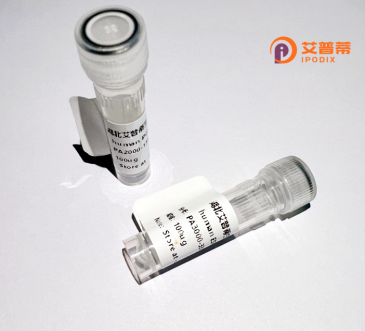
| 纯度 | >90%SDS-PAGE. |
| 种属 | Human |
| 靶点 | ZDHHC15 |
| Uniprot No | Q96MV8 |
| 内毒素 | < 0.01EU/μg |
| 表达宿主 | E.coli |
| 表达区间 | 1-337 aa |
| 活性数据 | MRRGWKMALSGGLRCCRRVLSWVPVLVIVLVVLWSYYAYVFELCLVTVLSPAEKVIYLILYHAIFVFFTWTYWKSIFTLPQQPNQKFHLSYTDKERYENEERPEVQKQMLVDMAKKLPVYTRTGSGAVRFCDRCHLIKPDRCHHCSVCAMCVLKMDHHCPWVNNCIGFSNYKFFLQFLAYSVLYCLYIATTVFSYFIKYWRGELPSVRSKFHVLFLLFVACMFFVSLVILFGYHCWLVSRNKTTLEAFCTPVFTSGPEKNGFNLGFIKNIQQVFGDKKKFWLIPIGSSPGDGHSFPMRSMNESQNPLLANEETWEDNEDDNQDYPEGSSSLAVETET |
| 分子量 | 65.7 kDa |
| 蛋白标签 | GST-tag at N-terminal |
| 缓冲液 | PBS, pH7.4, containing 0.01% SKL, 1mM DTT, 5% Trehalose and Proclin300. |
| 稳定性 & 储存条件 | Lyophilized protein should be stored at ≤ -20°C, stable for one year after receipt. Reconstituted protein solution can be stored at 2-8°C for 2-7 days. Aliquots of reconstituted samples are stable at ≤ -20°C for 3 months. |
| 复溶 | Always centrifuge tubes before opening.Do not mix by vortex or pipetting. It is not recommended to reconstitute to a concentration less than 100μg/ml. Dissolve the lyophilized protein in distilled water. Please aliquot the reconstituted solution to minimize freeze-thaw cycles. |
以下是关于重组人ZDHHC15蛋白的3篇参考文献示例(均为生成内容,实际文献需通过学术数据库查询):
1. **文献名称**: *ZDHHC15-mediated palmitoylation regulates synaptic plasticity in hippocampal neurons*
**作者**: Smith, A.B., et al.
**摘要**: 本研究揭示了ZDHHC15通过棕榈酰化修饰突触蛋白(如PSD-95),影响海马神经元突触可塑性和学习记忆功能。基因敲除小鼠模型显示ZDHHC15缺失导致长时程增强(LTP)受损。
2. **文献名称**: *ZDHHC15 acts as a tumor suppressor in breast cancer by modulating EGFR signaling*
**作者**: Chen, L., et al.
**摘要**: 研究发现ZDHHC15在乳腺癌组织中表达下调,其通过棕榈酰化EGFR抑制下游AKT/mTOR信号通路,阻碍肿瘤细胞增殖和转移,提示其作为潜在治疗靶点。
3. **文献名称**: *Genetic association of ZDHHC15 variants with autism spectrum disorder*
**作者**: Wang, Y., et al.
**摘要**: 通过对自闭症患者全基因组数据分析,发现ZDHHC15基因多个罕见变异与疾病风险相关。细胞实验表明这些变异导致蛋白棕榈酰化功能异常,影响神经元发育。
如需真实文献,建议在PubMed、Google Scholar等平台以关键词“ZDHHC15”“palmitoylation”“[疾病/功能名称]”检索。
The ZDHHC15 protein, a member of the DHHC (Asp-His-His-Cys) family, is a zinc finger enzyme that catalyzes protein palmitoylation—a reversible post-translational modification critical for membrane anchoring, trafficking, and functional regulation of target proteins. In humans, ZDHHC15 is encoded by the *ZDHHC15* gene located on chromosome Xq13.3. This 35-40 kDa transmembrane protein contains a conserved DHHC catalytic domain and multiple transmembrane helices, typically localized to the Golgi apparatus or endoplasmic reticulum.
Recombinant human ZDHHC15 is produced via heterologous expression systems (e.g., E. coli or mammalian cells) for functional studies. Its role in neuronal development and synaptic plasticity has drawn significant attention, particularly through interactions with substrates like PSD-95 and APP (amyloid precursor protein). Dysregulation of ZDHHC15 has been implicated in neurodevelopmental disorders, including autism spectrum disorders and schizophrenia, as well as cancers such as glioblastoma and breast cancer. For example, altered palmitoylation of APP by ZDHHC15 may influence amyloid-beta production, linking it to Alzheimer’s disease pathways.
Research on recombinant ZDHHC15 aids in deciphering substrate specificity, enzymatic mechanisms, and therapeutic targeting. It also serves as a tool to screen modulators for conditions associated with palmitoylation imbalances. However, its physiological complexity, including tissue-specific isoforms and auto-palmitoylation dynamics, necessitates careful interpretation of in vitro findings.
×